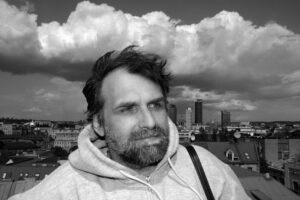Aidas Marčėnas

Photo by Algimantas Aleksandravičius
Aidas Marčėnas (b. 1960) is one of Lithuania’s most prolific poets. He stands out from his own generation and from younger poets for the attention he pays to form, favouring traditional rhymes and metres and experimenting with exotic genres like the Japanese tanka. Marčėnas is also very fond of postmodernist games – his poems contain a variety of overt and covert quotations, allusions and paraphrases. In addition to his poetry, he is considered to be one of the most perceptive literary critics, and his reviews, along with his short essays and interviews, have been published in several volumes. All this has been achieved without any formal literary training. Marčėnas briefly studied television production, but did not graduate, and for a while he made a living doing all kinds of jobs, including a stint as a firefighter. Winner of every major poetry award, as well as the Lithuanian National Prize for literature, Marčėnas is an idol and a poetic father to the new generation of poets. His works have been translated into English, Belarusian, Polish, French, Russian and other languages.
He made his debut in 1988 with a collection of poems Šulinys (A Well). This collection, as well as Marčėnas’s other collections published in the ’90s, combine traditional forms (rhyming quatrain, sonnet, triolet) with the topics of ugliness and the grotesque, and the use of colloquial language that was novel and unusual in Lithuanian poetry at the time. For example, he has written sonnets about the heavy drinking of writers, consumption of opiate drugs, and urinating while looking at the starry winter sky. Marčėnas would “sharpen” this combination of lowbrow and highbrow styles even more by employing quotations from the Bible, classic works of Lithuanian and world poetry, and references to myths (the myth of Orpheus is particularly influential).
So-called metapoetry has dominated Marčėnas’s works in the past few decades, such as his latest collection Ir (And, 2019). The poems explore the birth of poetry, the poet’s relationship with language, the connection between language and the world and a personal connection with poetry, a certain addiction to it. What is poetry, why is it written, how, what from, why is a poem born – these are the questions that, according to Marčėnas, can only be answered by the poet who is writing the poem.
Selected translations
Russian: Декларация об имуществе / Turto deklaravimas. Tranlsated by Georgij Jefremov. Moscow: Georgij Jefremov, 2002
Translations on-line: www.lyrikline.org/en/authors/aidas-marcnas